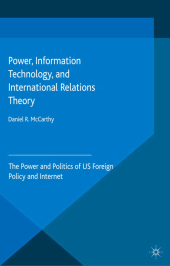 Neuerscheinungen 2015Stand: 2020-02-01 |
Schnellsuche
ISBN/Stichwort/Autor
|
Herderstraße 10
10625 Berlin
Tel.: 030 315 714 16
Fax 030 315 714 14
info@buchspektrum.de |

D. McCarthy
Power, Information Technology, and International Relations Theory
The Power and Politics of US Foreign Policy and the Internet
1st ed. 2015. 2015. x, 220 S. 216 mm
Verlag/Jahr: SPRINGER PALGRAVE MACMILLAN; PALGRAVE MACMILLAN UK 2015
ISBN: 1-349-45525-3 (1349455253)
Neue ISBN: 978-1-349-45525-6 (9781349455256)
Preis und Lieferzeit: Bitte klicken
This book examines the internet as a form of power in global politics. Focusing on the United States´ internet foreign policy, McCarthy combines analyses of global material culture and international relation theory, to reconsider how technology is understood as a form of social power.
1. Introduction 2. Power to the People: Looking for Agency in IR Treatments of ICTs 3. Towards A Historical Materialist Theory of Technological Power 4. U.S. Foreign Relations and the Institutional Power of the Internet 5. Pursuing Technological Closure: Symbolic Politics, Legitimacy and Internet Filtering 6. The Narration of Innovation in American Internet Policy 7. Conclusion
"A brilliant exercise in the crossroads of international relations and science and technology studies. McCarthy deftly analyses the Internet´s rhetoric of structure as a product and instrument of US foreign policy. Cooly interdisciplinary, McCarthy´s study is socially relevant and intellectually rigorous." - Professor Monroe Price, Annenberg School, University of Pennsylvania, USA
"Who controls the global communications infrastructure controls the conduct of international relations. This welcome volume shows how central this control is to US foreign policy and why rival states and activists are so keen to contest it. Technology and power were at the heart of early International Relations theory. McCarthy brings them back." - Professor Ben O´Loughlin, author of Strategic Narratives: Communication Power and the New World Order
"Daniel R. McCarthy´s book constitutes a timely and refreshing step forward as it illuminates our understanding of how digital communications technologies, foreign policy, and structural power are inter-related. For him, the ways in which most US officials and IR theorists have conceptualized the Internet and related developments reflect a dubious sense of historical inevitability and a kind of technological rationality. Through his critique McCarthy highlights the unequal capacities of those involved in the Internet´s construction alongside its entrenchment as a form of institutional power. In sum, this important book should be read by IR theorists, foreign policy analysts, and anyone else concerned about the often ignored ideological and structural implications of the Internet and still broader policy questions concerning this technology-cum-institution." - Professor Edward A. Comor, University of Western Ontario, Canada
"Daniel McCarthy has written an intellectually provocative and empirically rich account of the role of technology in International Relations, with a specific focus on the role of American structural power. Timely, clearly written, and widely engaging, McCarthy puts forward a sophisticated theoretical treatment, which prompts us to think of technology as ´institutions´ and as products of social power rather than instrumentalist artefacts or deterministic forces beyond human control. Students of Internet politics would find in this book a rewarding historical and theoretical framework to help illuminate the ongoing debates about surveillance, privacy, and the future of global networks." - Ronald J. Deibert, Professor of Political Science and Director, the Citizen Lab, Munk School of Global Affairs, University of Toronto


